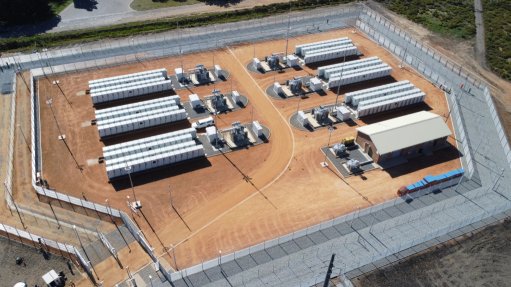
Eskom's Hex grid-battery installation
South Africa should consider ways to replicate strategies employed in regions such as South Australia and California to facilitate an accelerated uptake of grid batteries, which a new International Institute for Sustainable Development (IISD) report states can be introduced to support grid stability and bolster the flexibility required to support variable renewables generation.
While stressing that solutions are “location specific”, the report, which is the second in a series by IISD, argues that some replicable strategies could include enabling battery operators to benefit from multiple revenue streams and offering specific financing mechanisms for initial projects.
Based on interviews with over 70 experts in the field, the paper reports that primary concerns among potential grid-battery developers are access to multiple revenue streams, or revenue stacking, and access to capital for upfront installation costs.
"These are linked, as revenue stacking can ultimately improve access to capital. So, a priority
action is to work on the actions that enable revenue stacking," the paper asserts.
Besides more supportive policy and regulation, it proposes several priority interventions, including determining financial compensation for services, developing a market for services and making revisions to existing tariff structures to improve the business model for grid batteries.
The report also identifies a prevailing lack of understanding of battery opportunities, together with disjointed planning processes and financial obstacles as key constraints to the roll-out of grid batteries.
“While South Africans are already rapidly installing consumer batteries (located at consumer premises), grid batteries (storage installed on the grid) are an under-recognised part of the solution to the country’s electricity supply issues,” the authors of the paper, titled ‘Watts in Store Part 2’ assert.
Lead author Richard Halsey argues that grid batteries can bring a new era of flexibility, as besides from operating as standalone stores of power, they can complement renewables, particularly solar PV.
In addition, growing demand for batteries represents an opportunity to boost the South African economy and job creation.
This, owing to the availability of many of the critical minerals required for both the market-leading lithium-ion batteries and also the vanadium required for vanadium redox flow batteries which owing to their longer-duration storage are forecast to play a growing role in the sector.
The report notes that South Africa has extensive reserves of vanadium and that local production and beneficiation of critical minerals to battery grade (particularly vanadium) could shield South Africa from potential battery cost increases if coupled with local battery assembly.
“With a shift under way in South Africa toward a more open electricity market with competitive trading, there will only be increasing prospects for grid batteries,” Halsey adds, pointing to rapid growth internationally with 75% more capacity added in 2022 than in 2021.